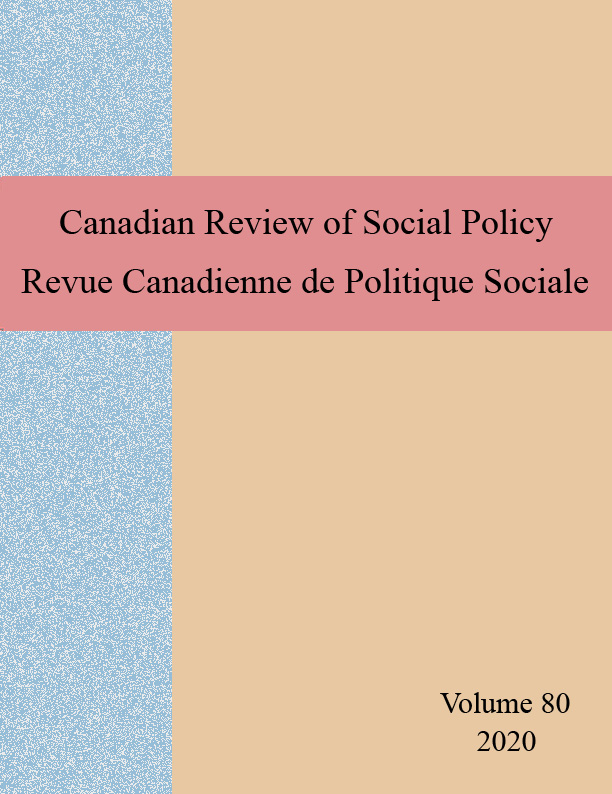Direct Funding and the Depoliticization of Home Care Systems: Popular Rhetoric and Policy Directions in Ontario
Keywords:
aging, Canada, disability, self-managed careAbstract
Home care systems have undergone major transformation in the last twenty years, manifesting as a volatile series of policy changes in Ontario, Canada. This includes increasing attention to direct funding (DF) home care where individuals receive cash transfers to arrange their own services. Through a textual analysis of 101 media and grey literature sources about DF home care in Ontario published between 2011 and 2018, we find three interrelated, yet sometimes conflicting, discourses in public circulation. DF is represented as: (1) a ‘fix’ to the challenges of mainstream home care; (2) a form of marketization; and (3) as social transformation. We argue that these discourses reflect a neoliberal policy climate that depoliticizes and instrumentalizes DF in ways that obscure how continual policy adjustments actually contribute to frustrating experiences with home care. The contradictory claims about DF home care in the public domain often untether DF from its social justice history and from the careful implementation needed for it to be an empowering and equitable home care model. We suggest that DF home care should not be approached primarily as an individual fix to systemic problems with home care nor as a strategy for cost saving. Rather, DF should be one component of a broad spectrum of social care policies that fully acknowledge both the social justice history of the program and the complex interdependencies of home care users, workers and informal caregivers.
Résumé
Les systèmes de soins à domicile ont connu une importante transformation au cours des vingt dernières années, engendrant une série de changements politiques en Ontario (Canada), dont une attention croissante au financement direct (FD) des soins à domicile où les individus reçoivent des fonds pour gérer leurs propres services. En analysant 101 textes des médias et de la littérature grise au sujet du FD des soins à domicile, nous trouvons trois discours en libre circulation qui sont étroitement liés mais parfois contradictoires. Le FD est présenté comme étant (1) une « solution » aux défis que posent les soins à domiciles traditionnels, (2) une forme de marchéisation et (3) une transformation sociale. Nous soutenons que ces discours sont le reflet d’un milieu politique néo-libérale qui dépolitise et instrumentalise le FD de manière à masquer la façon dont l’ajustement continu des politiques concourt réellement aux expériences frustrantes liées aux soins à domicile. Les affirmations contradictoires au sujet du FD des soins à domicile du domaine public détachent souvent le FD de son histoire de justice sociale et de la mise en œuvre minutieuse nécessaire pour qu’il devienne un modèle de soins à domicile responsabilisant et équitable. Nous proposons que le FD des soins à domicile ne soit pas abordé comme une solution individuelle aux problèmes systémiques liés aux soins à domicile ou comme une stratégie visant à réduire les coûts, mais plutôt comme faisant partie d’un large éventail de politiques d’assistance sociale qui reconnaît pleinement l’histoire de justice sociale du programme ainsi que l’interdépendance complexe entre les usagers des soins à domiciles, les travailleurs et les aidants naturels.
Mots clés: vieillissement; Canada; invalidité; soins autogérés
Downloads
Published
How to Cite
Issue
Section
License
1-The author guarantees that the manuscript is an original work not published elsewhere in print or electronically in whole or in part, except in abstract form, that the author has the full power to make this contribution, and that the manuscript contains no matter libelous or otherwise unlawful or which invades the right of privacy or which infringes any proprietary right.
2-The author guarantees that the manuscript has not been previously published in print or electronically and that if the manuscript contains any tables, figures or images fully reproduced or closely adapted from previously published material, the author must obtain the necessary permission from the author/publisher holding the original copyright prior to publication in CRSP. The author may be required to produce evidence of permission granted to CRSP’s editors.
3-As a condition of publication in CRSP, the author assigns all copyright to CRSP, including but not limited to the right to publish, republish, and otherwise distribute this manuscript in print, electronic, or other formats. As CRSP is a non-profit interdisciplinary scholarly journal, the author will receive no royalty or other monetary compensation for the assignment set forth in this agreement.
For the purpose of full disclosure, CRSP will not normally use the content provided by the author in a commercial venture, but for the purpose of disseminating the author’s content to as many readers as possible. For distribution, third parties engaging in commercial activities may be contracted to distribute the content globally, and such parties may make a profit out of the author’s content in their normal course of business. CRSP will not pay the author or reimburse the author in any form based on such commercial activities because the conduct of such commercial activities is outside the control of CRSP.
Any future reference to or use of this published material by the authors must acknowledge CRSP as the original place of publication.
PERMISSION REQUEST/ARCHIVING
Permission is given to author(s) receiving funding via Tri-Council Agencies, the Canadian Institutes of Health Research (CIHR), the Natural Sciences and Engineering Research Council of Canada (NSERC) and the Social Sciences and Humanities Research Council (SSHRC), to make their publications freely available in an Open Access repository within the stated deadline by the Tri-Council Agencies (12 months following publication). Archiving of publication must be a manuscript copy bearing none of the CRSP headers, footers or any other distinguishing marks. No links to the article on the CRSP website is permitted.
Permission requests from third parties to reproduce articles in part or full in academic/educational publications can be directed to the managing editor of CRSP, and will not be unreasonably denied.

